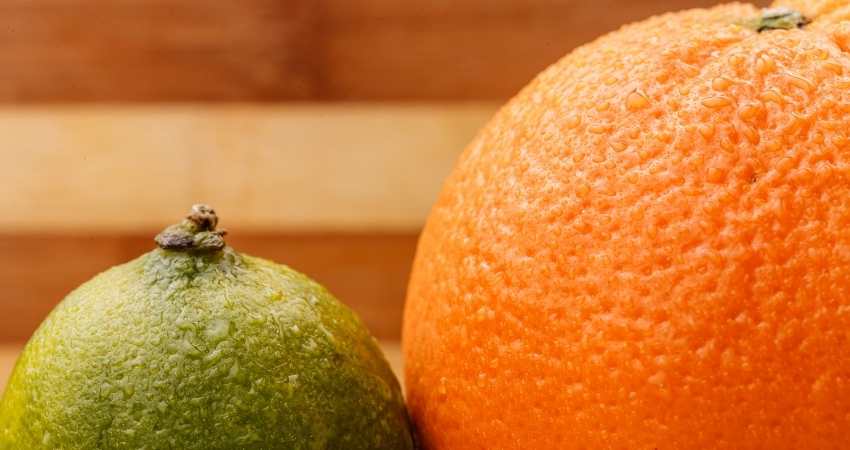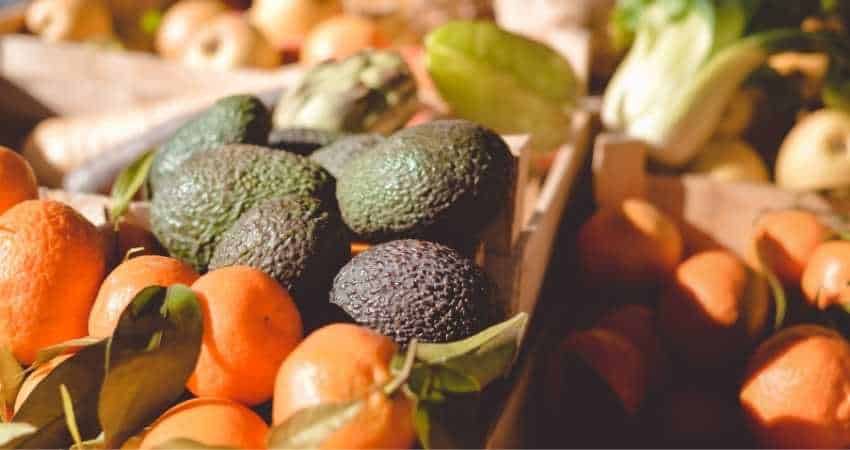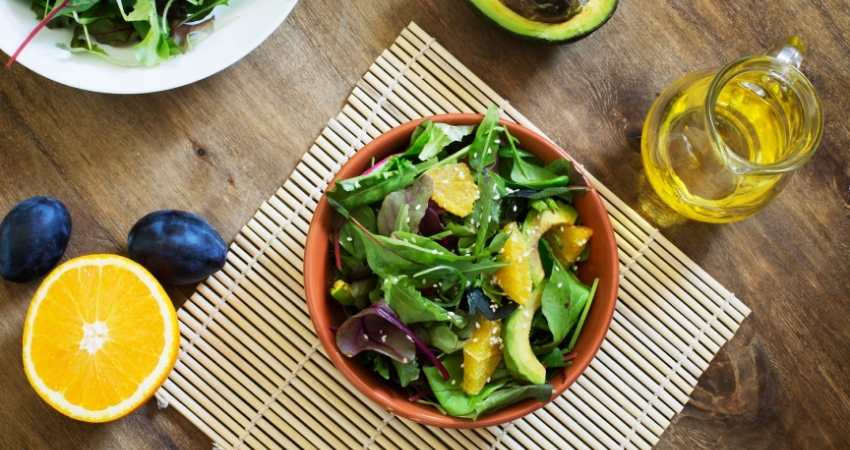Can You Store Avocados and Oranges Together?
Let’s take a close look about storing avocados and oranges together.
Avocados and oranges can be stored together. Fruits producing ethylene should not be stored with those sensitive to ethylene. Since oranges are not sensitive to the ethylene gas that avocados produce, they can be stored together. In addition, oranges do not produce damaging ethylene gas, so it’s safe for the ethylene sensitive avocado.
As a Certified Health Coach many clients ask about storing fruit all the time. I purchase and store both fruits myself. Keep these things in mind when deciding where to store avocados and oranges.
Ripeness Stage

When you store fruits, you should consider how ripe they are. Avocados continue to ripen once picked1 and oranges don’t2. However, if the avocados aren’t ready yet, store them properly, and eat them when they ripen.
It can take a while for the fruit to get transported from the farm to your local store. When picking out avocados, consider their softness and smell. These can tell you a lot about their ripeness, and you can use that information to store the fruit properly.
If you pick an avocado that’s not ripe, you’ll need to store it for a few days. Unfortunately, the two fruits have different ideal environments for storing. For this reason, you should consider where you store each one.
Best Environment
The best environment for avocados is at room temperature. You can put the fruit out on your counter, and it will ripen over a few days. After an avocado ripens, you can put it in your refrigerator3.
You can then keep the avocado for a few extra days if you’re not ready to use it. But when you do put it in the refrigerator, keep it away from other ethylene producing foods or from foods sensitive to ethylene.
You can put oranges in the crisper drawer of your fridge right away4. The oranges will last the longest if you don’t use any produce bags. However, you can use a mesh bag that will allow air circulation.
Because of their different needs, you may need to store avocados and oranges separately.

Ethylene Production
Many fruits produce a gas called ethylene, which can help ripen plants5. The gas can be helpful if you have an unripe fruit that you want to eat right away. But if too much of it gets in the fruit, it will over ripen it.
Even after you harvest fruits, they will continue to produce ethylene, and some produce more than the others. You should consider how much gas a type of fruit produces to determine where to store it.
If you want to speed up the ripening process, you can store fruit to maximize ethylene’s effects. To extend a fruit’s shelf life, you’ll want to minimize those effects.
Avocado Ethylene Production
Avocados give off more ethylene gas than other fruits, and it affects avocados more. The amount of ethylene they produce can also depend on the amount of carbon dioxide in the air6.
You can add more ethylene to help the avocados ripen, but it isn’t necessary. You shouldn’t store them with other fruits that produce ethylene if the avocado is ripe already..
Orange Ethylene Production
Oranges don’t produce ethylene that’s damaging to other fruit7. In addition, they aren’t sensitive to ethylene as some other fruits, so you don’t have to keep them away from other fruits. You can store oranges with almost any other fruit or vegetable.
Because avocados produce and are sensitive to ethylene, adding oranges shouldn’t matter in most situations. It’s always best to store your oranges with other citrus fruits or berries.
Fruits That Produce Ethylene
- Apples
- Avocados
- Bananas
- Cantaloupe
- Kiwi
- Peaches
- Pears
- Tomatoes
Fruits Sensitive to Ethylene
- Apples
- Avocados
- Bananas
- Cantaloupe
- Cucumber
- Grapes
- Honeydew
- Kiwi
- Lemons
- Lime
- Mango
- Peaches
- Pears
- Watermelon
Fruits Not Ethylene Sensitive
- Blueberry
- Cherries
- Grapefruit
- Oranges
- Pineapple
- Rasberries
- Strawberries
- Tomatoes
Where to Store Avocados
When you first get an avocado from the store, keep it on your counter at room temperature. Place them in a cool area away from too much light.
After a few days, move the avocados to the refrigerator. If you move the fruit too early, it will stop ripening. Once it’s ready to eat, use the cooler temperatures to extend the avocado’s life.
If you move it to the refrigerator for later, you should keep the avocados away from other fruits. Fruits can still produce ethylene in the fridge, so putting avocados too close might negate the benefits of refrigerating avocados.
You may also want to give extra room for your avocados. They can get soft after they ripen, and you won’t want something else to crush your avocado8.

What to Store With Avocados
If your avocado is not ripe, you may want to store them with bananas. Bananas have the right amount of ethylene gas to help ripen your avocado. If you want to eat the avocado sooner than later, you can take advantage of the bananas’ ethylene gas.
However, you don’t want to store avocados with bananas for more than a day or two. If you do this, you should check on them daily. That way, you can keep an eye on the ripeness, and adjust your fruit storage if necessary.
You can also store avocados together. However, the more you store them together, the faster they will ripen.
If you enjoy part of an avocado, you can cut it open and coat the rest with some lemon juice. Be sure to keep it in the refrigerator, and the lemon juice will keep the remaining part of the avocado from getting too brown.
Did you know avocados are a good replacement for electrolytes? Find out more in my article, 17 Gatorade Substitutes.

Where to Store Oranges
You should store oranges in the refrigerator, and keep them loose in your crisper drawer9. Oranges will last longer when they aren’t in a produce bag. While you can use a bag to organize them at the store, you should take them out when you get home.
If necessary, you can keep your oranges at room temperature for a few days. You may also want to take them out of the fridge a day before you juice them. At room temperature, it will be easier to get more of the juice out of the orange.
You can also juice and zest your orange, and store the remains in the freezer. That way, you can use the juice and zest even when oranges aren’t in season.
Oranges are a great fruit, and they don’t have too many strict storage requirements. But you may want to know what you can store with them.
What to Store With Oranges
Because oranges aren’t sensitive to ethylene and don’t produce it, you can store them with almost any fruit. You can store them alone, but they also do well if you store them with other citrus fruits.
If you have a small refrigerator, you can put the oranges anywhere you need to, but they will need some ventilation.
You can even store the oranges with avocados. Since oranges don’t ripen after being picked from the tree and aren’t sensitive to ethylene, they aren’t very picky when it comes to storage.
As long as you have enough space for them in your refrigerator, you shouldn’t have a problem. Be sure to check on your oranges before eating or freezing them.
If you have any questions to ask me about this article don’t hesitate to comment below or email us. You can find an email on our contact page.
Read Next – More Fruit Storage
Can You Store Blueberries in Tupperware?
Can You Store Blueberries and Strawberries Together?
Can You Store Tomatoes With Fruit?
- University of California, Davis: Fruit preparation and ripening [↩]
- SFGATE: Do Oranges Become Ripe When Off the Tree? [↩]
- Colorado Integrated Food Safety Center of Excellence: Avocados [↩]
- Seattle.gov: Fruit & Vegetable Storage Guide [↩]
- National Center for Biotechnology Information: Ethylene detection in fruit supply chains [↩]
- University of California, Davis: Ripening Avocados [↩]
- UCSD: Ethylene in Fruits and Vegetables [↩]
- AvocadoSource: Storage of Avocados [↩]
- University of California: Oranges: Safe Methods to Store, Preserve, and Enjoy [↩]
